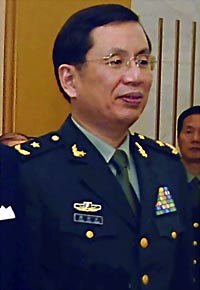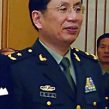
Personnel Changes in PLA Ranks: Chen Xiaogong
Publication: China Brief Volume: 9 Issue: 3
By:

The top-brass of the Chinese leadership started the Lunar New Year on a sprint. The year of the ox, which began on January 26 in the Gregorian calendar, was marked by fervent planning for Chinese Premier Wen Jiabao’s trip to the World Economic Forum in Switzerland. On January 30, a little over a week after his inauguration, President Barack Obama was on the phone with Chinese President Hu Jintao reassuring Beijing’s concerns over U.S. Secretary Treasury Timothy Geithner’s remarks on the Chinese currency as well as the two countries’ trade imbalances. According to a Xinhua report, President Obama described the relationship as "the most important bilateral relations for both sides" (Xinhua News Agency, January 31). Meanwhile, China’s "2008 National Defense White Paper" was quietly slipped under the doorstep of the White House on the day of the inauguration. According to military experts, the White Paper continues to conceal important details about China’s military modernization, which has been the source of tension with its neighbors and the United States (China Brief, March 14, 2008). The White Paper, nonetheless, provides a systematic window to recalibrate U.S. perceptions toward the attitudes and outlook of China’s top military planners (see Cheng-yi Lin’s article in this issue). All announced in close tandem with the release of the 2008 White Paper, the Beijing leadership also elevated the ranks of a number of officers to key executive posts in the People’s Liberation Army (PLA) Armed Forces and regional command (Ming Pao [Hong Kong], January 21). This move may signal the coming of age for the next generation of PLA leaders and illustrates a new direction that the PLA is taking in conducting military-to-military relations as the United States and China enter a new chapter in their bilateral relations.
According to multiple sources in the Chinese media, the most notable appointment is that of Deputy Chief of the General Staff for intelligence Lieutenant General Chen Xiaogong to the post of deputy commander of the People’s Liberation Army Air Force (PLAAF) under the command of General Xu Qiliang. Chen is a well known "princeling"—familiar to U.S. Sinologists—and is the son of the former People’s Republic of China (PRC) Ambassador to Japan and the United Nations, Chen Chu. Chen Xiaogong, 60 years old, has a long career in military intelligence, and served as a defense attaché at the PRC Embassy in Washington from 2001-2003, prior to his most recent appointment he served as the deputy director of the Foreign Affairs Office under the Central Committee and General Staff Department’s Second Department (Ming Pao, January 21). Chen’s elevation as the deputy commander of the PLAAF marks the first time in 40 years that a high-ranking army officer was made a high-ranking air force officer. Chen’s illustrious career in Chinese intelligence has earned him the nickname "Little Li Kenong," after the Chinese colonel general who was the director of the Chinese Communist Party (CCP) Central Investigation Department (Xilu.com, January 20).
Among other personnel changes verified by various Chinese sources, the central committee approved the appointment of Major General Xue Guojiang as deputy commander of the Chinese People’s Armed Police (PAP), Xue is replacing retiring Lieutenant General Chen Chuankuo; the 54th Group Army (in Jinan Military District) Commander, Song Puxuan, is replacing Rear Admiral Xu Chengyun as the deputy commander of the Nanjing Military Region under Lieutenant General Zhao Keshi; Second Artillery 54 Base (in Luoyang) Political-Commissar Guo Junbo was promoted to deputy political-commissar of the Second Artillery Corps under the directive of General Peng Xiaofeng (Ming Pao, January 21); and Major General Ren Haiquan, the head of education at National Defense University became its vice president (Ta Kung Pao, January 28).
Major General Ruan Zhibo, auditor-general of the PLA Audit Bureau, the internal financial audit organization that is subordinate to the Central Military Commission (CMC) but managed by the General Logistics Department, was made the deputy commander of the Chengdu Military Region, which includes the Tibet military district, under Commander Lieutenant General Li Shiming. The appointment of Major General Ruan, 58 years old, marks the first time that an officer in the audit bureau was selected to serve in a leadership position of a major military region (Nanfang Daily, January 31).





